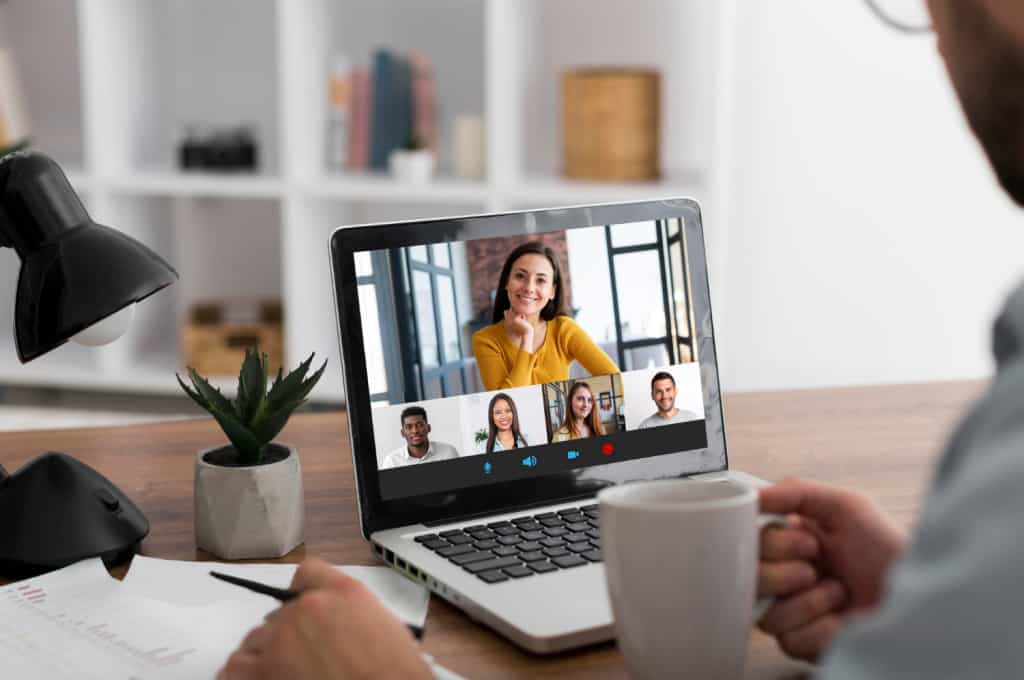Video interviews offer a great opportunity for companies to save time and money while screening candidates. Video interviews allow employers to quickly screen multiple candidates virtually, helping to identify the most qualified applicants quickly and efficiently. Video interviews are convenient for both the employer and the candidate, as they can be conducted remotely at any time. However, there are also some potential drawbacks to using video interviews for candidate screening, such as the difficulty of accurately assessing a candidate’s communication skills and personality. Additionally, some candidates may not be able to access the technology requirements for a video interview, or may feel uncomfortable with the format.
Overall, video interviews can be an effective tool for employers when used properly. To get the most out of video interviews for candidate screening, it is important to ensure that the technology requirements are accessible to all potential candidates and that the interviewer is well-versed in the specific skills that they are screening for. Additionally, it is important to be aware of the potential drawbacks of video interviews, such as the difficulty in assessing a candidate’s personality, and to take steps to ensure that all candidates are comfortable with the process.
Table of Contents
ToggleThe Importance of Interviews in Candidate Screening
Interviews are an essential tool for employers in the candidate screening process. By conducting interviews, employers can get to know potential candidates better and assess their suitability for the role. Interviews allow employers to get a better understanding of a candidate’s qualifications, skills and experience. They also allow employers to ask questions, assess a candidate’s attitude and work ethic, and evaluate their communication and presentation skills.
Interviews can also provide valuable insight into a candidate’s personality and how they would fit into the company culture. Employers can ask questions about the applicant’s goals, ambitions, and interests to get a better idea of their motivations and values. Additionally, interviews can help employers identify areas of improvement and understand how the candidate can contribute to the team and the business.
Overall, interviews play a crucial role in candidate screening and bias reduction. They enable employers to get a better understanding of who the candidate is and whether they are a good fit for the role and the organization. By conducting interviews, employers can make more informed decisions when selecting the most suitable candidate.
Hirebee understands how important it is to get that first interview with an applicant right, which is why there are a multitude of automated features that can ensure the right candidates come your way. Through improved candidate screening software that includes screening features and further recruitment automation, you can find the right candidates.
The Pros of Using Video Interviews for Candidate Screening
Multiple Decision-Makers Can Attend the Interview
Virtual interviews offer a number of advantages when compared to face-to-face interviews. One major benefit of virtual interviews is that multiple decision makers can attend the interview. This is especially helpful when managing a geographically dispersed interviewing team. Having multiple decision makers involved in the interview process allows for a more informed, collaborative decision-making process. It allows for more voices to be heard and for the team to make a more informed decision.

Another benefit of virtual interviews is that it allow for more efficient use of time. When multiple decision makers are involved, it is much easier to coordinate everyone’s schedules for a virtual interview than for a face-to-face interview. This means that the interviewing process can move along more quickly and the team can come to a decision in a shorter amount of time.
Virtual interviews also provide more flexibility for both the interviewer and the candidate. Candidates can be interviewed from any location, allowing them to be more comfortable in their own space. This can lead to less stress and anxiety on the part of the candidate, which can help them to better communicate their skills and experience. Similarly, the interviewer can access a variety of resources during the interview process, such as resumes, portfolios, or other documents, which can help to make the interview process more efficient.
Better Scheduling Flexibility
Virtual interviews offer several advantages that make them a great choice for employers and candidates alike. The main benefit of virtual interviews is the scheduling flexibility they offer. As the interview is conducted online, both the interviewer and the candidate can find a convenient time to meet. This is particularly beneficial for candidates who have to travel long distances or who have very busy schedules.
Virtual interviews are also much more cost-effective than traditional, face-to-face interviews. As there is no need to pay for travel expenses or hire a meeting room, employers can save a considerable amount of money by conducting interviews virtually, while contributing to bias reduction.
Virtual interviews also provide a unique opportunity for employers to assess the skills and knowledge of a candidate in a more flexible manner. As the interview is conducted online, the interviewer can use a variety of tools and techniques to assess a candidate’s skills and knowledge more effectively. This could include the use of online tests, simulations, and questionnaires.
Less Pressure on Candidates
A virtual interview lowers the pressure on a job candidate. Because the candidate doesn’t have to travel to the interviewer’s location, they don’t have to worry about the time and cost of transportation or the stress of being in an unfamiliar place. The relaxed atmosphere of the virtual interview also lowers the stress level of the candidate, allowing them to focus more on the questions and the responses.
The virtual interview also allows the interviewer to get to know the candidate on a more personal level. The interviewer can see the candidate’s body language and facial expressions, which can give them insight into the candidate’s personality and experience. This can be beneficial to both parties.
The candidate also benefits from the fact that they can take their time to think of the best answer to the question without worrying that the interviewer might think they are taking too much time. In addition, the flexibility of the virtual interview allows the candidate to take breaks during the interview if needed.
Overall, virtual interviews offer many benefits to the candidate and the employer. They reduce the stress level of the candidate, allow the interviewer to get to know the candidate better, and offer the flexibility of taking breaks and thinking of the best response.
Allows For a Clear Look at Applicant’s Communication Skills
One of the greatest advantages of virtual interviews is that they allow for a clear look at an applicant’s communication skills. With virtual interviews, there are no distractions or interruptions that could lead to a misunderstanding of the applicant’s responses. As a result, employers can get a better understanding of how an applicant communicates, both verbally and non-verbally. It can also be easier to observe an applicant’s body language and facial expressions. These factors can help employers to gain a better understanding of the applicant’s capabilities.

Another great benefit of virtual interviews is that they can be conducted in a timelier manner. Since they can be conducted over the internet, employers can quickly and easily schedule and conduct interviews with applicants. This eliminates the need for travel time and costs associated with in-person interviews. Moreover, virtual interviews also eliminate the need for large amounts of paperwork, which can take up a considerable amount of time. All of this can help employers make more informed decisions about which applicants to hire.
The Cons of Using Video Interviews for Candidate Screening
An Inability to Judge Non-verbal Cues
The cons of a virtual interview are that it does not allow for an interviewer to judge non-verbal cues. This can be a disadvantage for the interviewer because non-verbal communication can often be a better indicator of a person’s true feelings and emotions than verbal communication. Non-verbal communication can provide insight into a candidate’s comfort level, confidence, and enthusiasm as well as their ability to read and respond to their environment. Without the ability to gauge these non-verbal cues, the interviewer can feel disconnected from the candidate and may not be able to accurately assess the candidate’s suitability for the position. Furthermore, the candidate may feel disconnected from the interviewer and the interview process, which can make it difficult for them to effectively answer questions. This can lead to an incomplete assessment of the candidate’s skills and abilities, which can be detrimental to the hiring process. As such, while virtual interviews are becoming increasingly popular due to their convenience, they cannot effectively gauge non-verbal cues and should be used with caution.
There Could be Distractions in the Background
Virtual interviews have become increasingly popular in recent years, however, they also have their drawbacks, one of the main drawbacks being distractions in the background. During a virtual interview, the interviewer can only see the applicant’s face and head, not their entire environment. This means that the applicant could have any number of distractions going on in the background that the interviewer is unaware of. The applicant could have noisy pets, children running around, or even loud music playing, which can make it difficult for the interviewer to hear and understand what the applicant is saying. Additionally, it can be distracting for the applicant, who may be paying more attention to the noises in their environment than to the interviewer.
Another issue with virtual interviews is that technology can be unreliable. Poor connection speeds, audio or video issues, or the applicant’s computer freezing or crashing can all cause problems during a virtual interview. This can be incredibly distracting and can make it difficult for the interviewer and applicant to communicate effectively.
Overall, virtual interviews can be beneficial in some cases, but they come with the risk of distractions in the background that can make it difficult for the interviewer to effectively assess the applicant.
Greater Likelihood for Fraud
One of the biggest cons of virtual interviews is internet connection issues. Poor internet connections can cause video interviews to freeze, lag, or even cut out entirely. This can lead to a poor candidate experience, as the interviewer and candidate are unable to communicate in real time. Furthermore, if the interviewer is unable to hear the candidate’s answers or the candidate cannot hear the interviewer’s questions, the virtual hiring process may be compromised. Additionally, if the candidate cannot connect properly, he or she may be excluded from the hiring process. To mitigate this issue, it is important to ensure that both the interviewer and candidate have good internet connections and video streaming capabilities before the virtual interview. Companies can also provide technical support to help candidates troubleshoot any internet connection issues they may experience.

Internet Connection Issues
The potential for fraud is one of the biggest cons of virtual interviews. When conducting a virtual interview, it is difficult to verify a candidate’s identity, as they could be using someone else’s information to present themselves as a different person. Additionally, a virtual interview makes it difficult to authenticate the candidate’s credentials, as there is no physical copy of the documents to verify. Furthermore, the candidate may be using someone else’s computer or even a computer with software that can manipulate the candidate’s responses. In addition, the virtual interview process makes it difficult for interviewers to establish a rapport with the candidate, as the lack of physical presence can be a barrier to connection. Finally, the lack of physical presence can also make it difficult to assess the candidate’s non-verbal cues, as they cannot be seen or heard. All of these factors can potentially lead to an increased risk of fraud during a virtual interview.
Conclusion
Video interviews offer many advantages for employers and candidates alike. They are more cost-effective, provide a higher degree of convenience, and reduce barriers to entry for candidates from diverse backgrounds. However, video interviews also come with some drawbacks. Video interviews can be more impersonal and lack the human touch. Additionally, they may be less effective in measuring the softer skills of candidates and can create a more intimidating atmosphere in which the candidate may struggle to stay focused.
Overall, video interviews are a great way to quickly and cost-effectively connect with potential candidates, but they should not be used as the sole method of assessing applicants. Employers should consider using a combination of video interviews, in-person interviews, and other techniques to ensure they make the best hiring decision.









